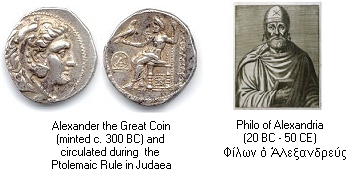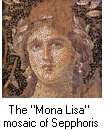|
Recently someone wrote to tell me that I am teaching error because I state that the New Testament was originally written in Koine Greek rather than in first century Hebrew. After all, since Jesus and his disciples all spoke Hebrew, it's only natural that the New Testament would have been written in Hebrew as well, right? In other words, in light of the Jewish roots of the Christian faith, why should we trust in the Greek New Testament?
In response, first it should be understood that there is a long history of "Hellenism" (Greek culture/influence) among the Jewish people, both in ancient Alexandria as well as in the Promised Land itself. Ossuaries dating from the Second Temple period indicate Greek artwork and Greek versions of Hebrew names. In Biblical Archaeological Review, Pieter W. Van Der Horst writes, "One of the most surprising facts about funerary inscriptions [extant from ancient Palestine dating from 300 B.C. to 500 A.D] is that most of them are in Greek - approximately 70 percent; about 12 percent are in Latin; and only 18 percent are in Hebrew or Aramaic." Furthermore, since the time of Alexander the Great (c. 330 B.C), many of the Jewish High Priests had become "Hellenists" which led to the rejection of the Temple by the Essene Community and eventually to the later Maccabean revolts. Even the Dead Sea Scrolls include Greek texts among the Hebrew and Aramaic. So it's clear that Hellenistic culture and Greek language were pervasive influences in Israel both before, during, and after the time when Yeshua lived in ancient Israel.
 |
It is certain that Yeshua himself spoke Greek (as well as Aramaic, Hebrew and perhaps Latin). Greek was well understood in "Galilee of the Gentiles," the region where Yeshua grew up as a child. Moreover, Yeshua lived just four miles from the city of Sepphoris (Tzipori), a cosmopolitan and Hellenistic city mentioned by Josephus as "the ornament of all Galilee." Greek-speaking Jews were common during the days of Yeshua, and even many of Yeshua's disciples had characteristically Greek names (e.g., Andrew, Philip, etc.). The New Testament records that Yeshua spoke to a Greek-speaking woman (Mark 7:26) and it is likely that he likewise spoke to Pilate in Greek (Mark 15:2-5; Matt. 27:11-14; Luke 23:3; John 18:33-38). In Acts 6:1 we read about how the "Hellenists" (῾Ελληνιστής) complained that many of their widows were being overlooked in preference to the Hebrew widows in the daily tzedakah. Note that these Hellenists were Greek-speaking Jewish believers in Yeshua -- not Gentiles. Moreover, the Apostle Paul chose to write in Greek because it was the lingua franca of the ancient world, and he regarded himself as "Apostle to the nations." Paul certainly knew Hebrew (see Acts 21:40, 26:14), but he consciously chose to write in Greek and reached out first to the Hellenistic synagogues during his missionary journeys.

Moreover, all of the ancient textual evidence for the New Testament is in Koine Greek, and scholars have not found a single manuscript in Aramaic or Hebrew that predates the Greek. The New Testament is by far the best-attested (and best preserved) literature of antiquity, with manuscript evidence dating back to the first century. For example, the Magdalen Fragments are written in a style of Koine Greek that was current in the 1st Century A.D. during the very lives of the apostles. Indeed, ancient papyrus expert Carsten Thiede and other scholars regard certain fragments from the Gospel of Matthew to be an eyewitness account.
We have some anecdotal evidence of a "Q" gospel that underlies the others gospel accounts, and it is undoubtedly true that there are some "Semitisms" found in the Greek text of the Gospels (Mark 5:41, 15:34, John 1:41, etc.), but it is clear -- both from history and from the textual evidence we have - that the Holy Spirit chose to use Koine (i.e., "common") Greek as the language to reach out to the world. This is true, incidentally, of the Torah and Nakh, which were also translated into Koine Greek (i.e., the Septuagint, or LXX). Many of the oldest Biblical fragments among the Dead Sea Scrolls correspond more closely with the LXX than with the (later) Masoretic text, and indeed we have evidence of Koine Greek manuscripts that were discovered in the Qumran caves themselves...
None of this is to imply that Paul and Yeshua did not speak Hebrew, of course, for it is certain they did (Acts 21:40, 26:14, etc.). Hebrew was clearly the language of religious Jews during the Second Temple period (just as it is to this day). However, the Greek text has been accepted by Yeshua's followers as far back as we can determine, and there is more and better textual evidence for this text than ALL other texts of antiquity -- INCLUDING the Hebrew text of the Torah itself!
We must be careful here. If you imply that the Greek New Testament is inaccurate, or that it "really" is some translation of some "lost Hebrew Gospel," etc., the authority of the Greek New Testament itself will be undermined. The same point can be made, incidentally, regarding the Hebrew text of the Old Testament. If you imply that the text of the Torah is inaccurate or that it is "really" a translation from pictograms that predate the "jots and tittles" of the Torah (Matt. 5:18), the authority of the Hebrew text will be similarly undermined...
Beware of those who attempt to "teach" you to distrust your Bible by suggesting that the Scriptures we have today are really faulty interpretations of some other "lost" texts. No, the only "lost texts" are those that will cause you become lost yourself by questioning the revealed Word of Truth (John 17:17; Eph. 1:13; 2 Tim. 2:15; James 1:18). Beloved, God's word will never fail (Psalm 12:6-7, Prov. 30:5-6; Mark 13:31).
|



